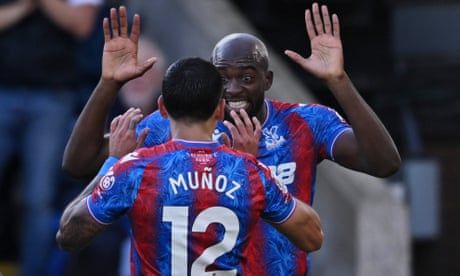
Oliver Glasner does not believe in magic. He is an admirably pragmatic
man who trusts his principles. He trusted them at the end of last
season when Palace looked like worldbeaters and everything was going
right, and he trusts them now when Palace look like relegation
candidates and everything is going wrong. Give it time and equilibrium
will return; the principles will have their effect. Or you could just
wait for the visit of Tottenham.
Trust the processes all you like, Spurs will still be Spurs, a paradox
that suggests there is some deeper process that ultimately matters far
more than the surface processes that can be seen and analysed. They
are a club with a fragile soul, capable always of producing a dreadful
half from nowhere. Poor Mikey Moore, who made his full Premier League
debut, barely got a look in. Rattled by Palace’s press, Spurs’ first
half was their worst half of the season other than the second half at
Brighton. If anything, it got worse after the break.
For Palace, it was a much-needed win, their first of the season, which
should ease the pressure on Glasner. It still feels slightly
bewildering that they’ve got to this pitch of anxiety so soon, with
potential replacements being openly discussed. In the last seven games
of last season, Palace took 19 points and scored 21 goals. “That was
not the truth about Palace,” Glasner had said. But what is the truth?
Is it this season, no wins and five goals from their eight games
before this one? Surely not, but could Palace’s dismal start to this
campaign really just be regression to the mean?
But there are reasons; there always are. Glasner has been openly
critical of the way the club signed four players on deadline day. But
even had their deals been completed in July, allowing them to be
integrated before the start of the season, Palace had the fourth
lowest net-spend in the division. The team who finished a place behind
them last season, Brighton, spent £160m more than Palace in summer.
Transfers aren’t everything, but that is placing Palace at a
disadvantage. And it’s not as though the signings who did come in
earlier in the window have made much of an impact so far. Daichi
Kamada and Ismaïla Sarr, the two players who looked as though they
might be able to replace at least some of Michael Olise’s creativity,
are yet to muster either a goal or an assist this season.
For now the absences are far more obvious than their replacements.
It’s not just that Olise’s imagination and drive has been lost, it’s
that without his partner on the right drawing defenders out of the way
and creating space, Daniel Muñoz has made far less impression, while
Eberechi Eze is missing a partner with whom he enjoyed such a
fruitful understanding. Similarly, Joachim Anderson’s defensive
qualities are missed, but so too are his sweeping diagonal passes and
switches of play. Jean-Philippe Mateta, after a golden finish to last
season, had struggled to get going, which is perhaps the result of his
exertions with France at the Olympics, but may also be to do with him
simply getting less service.